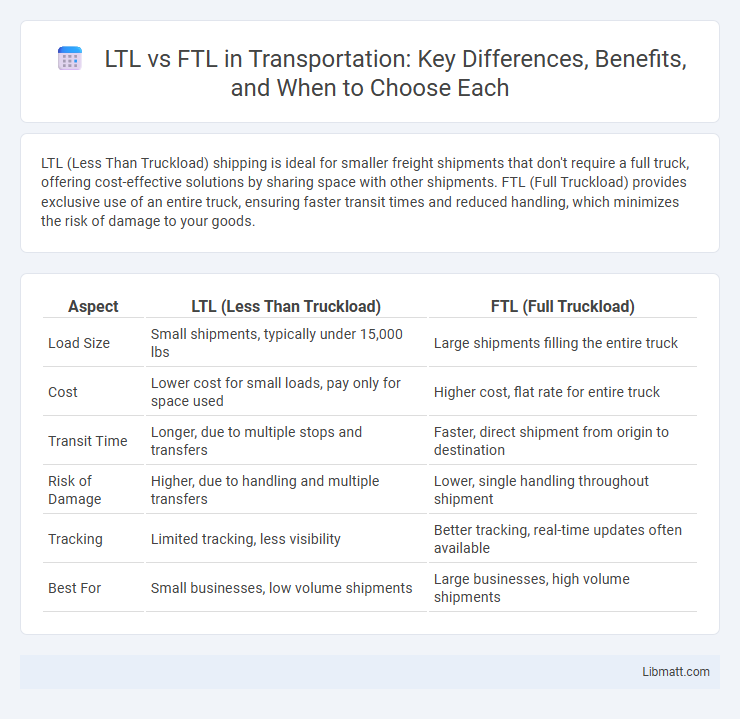LTL (Less Than Truckload) shipping is ideal for smaller freight shipments that don't require a full truck, offering cost-effective solutions by sharing space with other shipments. FTL (Full Truckload) provides exclusive use of an entire truck, ensuring faster transit times and reduced handling, which minimizes the risk of damage to your goods.
Table of Comparison
| Aspect | LTL (Less Than Truckload) | FTL (Full Truckload) |
|---|---|---|
| Load Size | Small shipments, typically under 15,000 lbs | Large shipments filling the entire truck |
| Cost | Lower cost for small loads, pay only for space used | Higher cost, flat rate for entire truck |
| Transit Time | Longer, due to multiple stops and transfers | Faster, direct shipment from origin to destination |
| Risk of Damage | Higher, due to handling and multiple transfers | Lower, single handling throughout shipment |
| Tracking | Limited tracking, less visibility | Better tracking, real-time updates often available |
| Best For | Small businesses, low volume shipments | Large businesses, high volume shipments |
Introduction to LTL and FTL Shipping
Less Than Truckload (LTL) shipping involves transporting smaller freight quantities from multiple customers in a single truck, making it cost-effective for shipments that do not require a full truckload. Full Truckload (FTL) shipping dedicates an entire truck to one customer's shipment, offering faster transit times and reduced handling compared to LTL. Choosing between LTL and FTL depends on shipment size, delivery speed, and budget considerations, with LTL optimizing efficiency for smaller loads and FTL maximizing speed and security for larger shipments.
Key Differences Between LTL and FTL
LTL (Less Than Truckload) shipping involves transporting smaller freight shipments that do not require a full truck, allowing multiple shippers to share space and reduce costs. FTL (Full Truckload) shipping dedicates an entire trailer to a single shipment, providing faster transit times and minimized handling for larger or time-sensitive loads. Key differences include shipment size, cost-efficiency, transit speed, and loading flexibility, with LTL suited for smaller, less urgent deliveries and FTL preferred for large, high-priority freight.
Understanding Less Than Truckload (LTL)
Less Than Truckload (LTL) shipping involves transporting smaller freight loads that do not require a full truck, making it cost-effective for businesses shipping moderate quantities. LTL carriers consolidate multiple shipments from various customers into one truck, optimizing space and reducing shipping costs. You benefit from flexible shipping options and reduced freight expenses compared to Full Truckload (FTL) services, especially when your shipment volume is less than a full truckload.
Exploring Full Truckload (FTL)
Full Truckload (FTL) shipping involves dedicating an entire truck to a single shipment, offering faster transit times and reduced risk of damage compared to Less Than Truckload (LTL) shipping. FTL is ideal for transporting large volumes or high-priority goods that require direct routes and minimal handling. Your supply chain benefits from enhanced efficiency and reliability when choosing FTL for shipments requiring full capacity and expedited delivery.
Cost Comparison: LTL vs FTL
LTL (Less Than Truckload) shipping typically costs less for smaller shipments as expenses are shared among multiple customers, making it cost-effective for shipments under 15,000 pounds. FTL (Full Truckload) shipping, while generally more expensive upfront, offers savings on larger shipments by providing dedicated truck space, reducing the risk of damage and delays. For businesses with frequent, large-volume shipments, FTL often delivers better cost efficiency compared to LTL's per-pound pricing model.
Transit Times and Delivery Speed
LTL (Less Than Truckload) typically involves slower transit times due to multiple stops and freight consolidation, resulting in longer delivery windows compared to FTL (Full Truckload), which offers direct shipping and faster transit. FTL shipments generally move more quickly since your freight occupies the entire truck, minimizing handling and transfer delays. Choosing FTL ensures quicker delivery speed, ideal for time-sensitive shipments.
When to Choose LTL Over FTL
Choosing LTL (Less Than Truckload) over FTL (Full Truckload) is ideal when shipping smaller freight volumes that do not require an entire trailer, offering cost efficiency by sharing space and expenses with other shippers. LTL is preferred for shipments ranging from 150 to 15,000 pounds or when flexibility in delivery locations and times is needed. Companies benefit from LTL when handling multiple smaller orders, reducing inventory costs and minimizing transportation waste, while FTL suits large-volume or time-sensitive shipments.
Factors Influencing FTL Preference
Fuel efficiency, delivery speed, and shipment size are key factors influencing the preference for Full Truckload (FTL) shipping over Less Than Truckload (LTL). Businesses with large quantities of freight benefit from FTL as it reduces handling and transit time, leading to lower damage risk and faster delivery. Cost-effectiveness for high-volume shipments and the need for dedicated routes often drive companies to choose FTL for logistics efficiency.
Environmental Impact: LTL vs FTL
LTL (Less Than Truckload) shipping reduces environmental impact by maximizing truck space utilization, leading to fewer trucks on the road and lower carbon emissions per shipment compared to FTL (Full Truckload) shipping. FTL shipments, while faster and more direct, often result in higher fuel consumption and increased greenhouse gas emissions due to empty or partially loaded trucks returning to origin points. Choosing LTL can help your business minimize its carbon footprint through more efficient transportation of smaller freight loads.
Choosing the Best Freight Solution for Your Business
Selecting between LTL (Less Than Truckload) and FTL (Full Truckload) depends on your shipment size, budget, and delivery speed requirements. LTL is cost-effective for smaller, less urgent loads by sharing truck space with other shipments, while FTL offers faster transit and reduced handling risk for large or time-sensitive consignments. Evaluating your business's freight volume and deadlines ensures optimal transportation efficiency and cost savings.
LTL vs FTL Infographic

 libmatt.com
libmatt.com